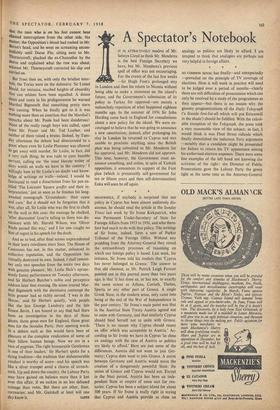* * *
MEANWHILE, if anybody is surprised that our policy in Cyprus has been almost uniformly dis- astrous, he should read the article in the Sunday Times last week by Sir Ivone Kirkpatrick, who was Permanent Under-Secretary of State for Foreign Affairs from 1953 to 1956, and who there- fore had much to do with that policy. The writings of Sir Ivone, indeed, form a sort of Parker Tribunal of the Foreign Office. Without any prodding from the Attorney-General they reveal the extraordinary processes of reasoning on which our foreign policy is based. Last week, for instance, Sir Ivone told his readers that 'Cyprus has never belonged to Greece.' The answer to that old chestnut, as Mr. Patrick Leigh Fermor pointed out in this journal more than two years ago, is that 'it has done so, or has not, to exactly the same extent as Athens, Corinth, Thebes, Sparta or any other part of Greece. A single Greek Stale, in the modern sense, only came into being at the end of the War of Independence in the past century.' Sir Ivone's main point was that in the Austrian State Treaty Austria agreed not to unite with Germany, and that similarly Cyprus should bind herself not to unite with Greece. 'There is no reason why Cyprus should resent an offer which was acceptable to Austria.' Ac- cording to Sir Ivone we have in Cyprus 'as close an analogy with the case of Austria as politics are likely to afford.' Here are just some of the differences. Austria did not want to join Ger- many; Cyprus does want to join Greece. A union between Germany and Austria would mean the creation of a dangerously powerful State; the union of Greece and Cyprus would not. Except in the Nazi period, Austria has been an inde- pendent State or empire of some sort for cen- turies; Cyprus has been a subject island for about 500 years. If Sir Ivone is really right in saying that Cyprus and Austria provide as close an analogy as politics are likely to afford, I am tempted to think that analogies are perhaps not very helpful in foreign affairs.


































 Previous page
Previous page